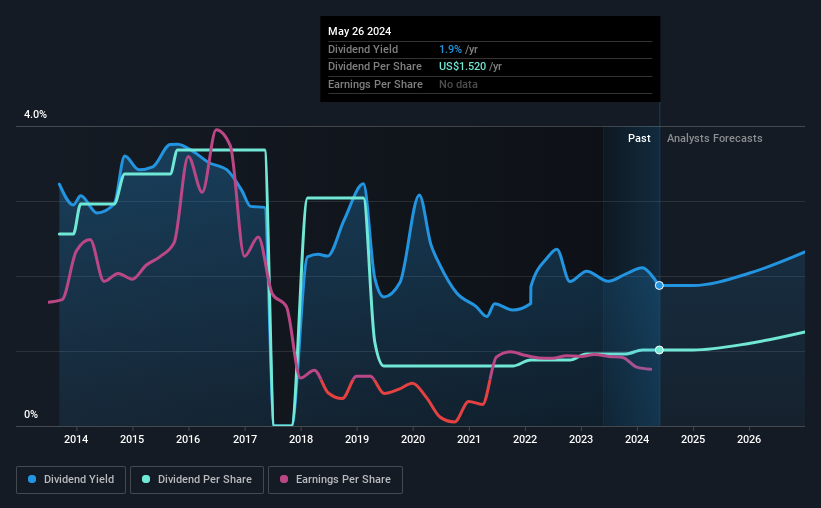Income Investors Should Know That DuPont de Nemours, Inc. (NYSE:DD) Goes Ex-Dividend Soon
Readers hoping to buy DuPont de Nemours, Inc. (NYSE:DD) for its dividend will need to make their move shortly, as the stock is about to trade ex-dividend. Typically, the ex-dividend date is one business day before the record date which is the date on which a company determines the shareholders eligible to receive a dividend. The ex-dividend date is an important date to be aware of as any purchase of the stock made on or after this date might mean a late settlement that doesn't show on the record date. Meaning, you will need to purchase DuPont de Nemours' shares before the 31st of May to receive the dividend, which will be paid on the 17th of June.
The company's next dividend payment will be US$0.38 per share, on the back of last year when the company paid a total of US$1.52 to shareholders. Based on the last year's worth of payments, DuPont de Nemours has a trailing yield of 1.9% on the current stock price of US$81.12. If you buy this business for its dividend, you should have an idea of whether DuPont de Nemours's dividend is reliable and sustainable. That's why we should always check whether the dividend payments appear sustainable, and if the company is growing.
See our latest analysis for DuPont de Nemours
Dividends are typically paid from company earnings. If a company pays more in dividends than it earned in profit, then the dividend could be unsustainable. DuPont de Nemours distributed an unsustainably high 159% of its profit as dividends to shareholders last year. Without more sustainable payment behaviour, the dividend looks precarious. Yet cash flows are even more important than profits for assessing a dividend, so we need to see if the company generated enough cash to pay its distribution. Fortunately, it paid out only 45% of its free cash flow in the past year.
It's disappointing to see that the dividend was not covered by profits, but cash is more important from a dividend sustainability perspective, and DuPont de Nemours fortunately did generate enough cash to fund its dividend. Still, if the company repeatedly paid a dividend greater than its profits, we'd be concerned. Extraordinarily few companies are capable of persistently paying a dividend that is greater than their profits.
Click here to see the company's payout ratio, plus analyst estimates of its future dividends.
Have Earnings And Dividends Been Growing?
Businesses with strong growth prospects usually make the best dividend payers, because it's easier to grow dividends when earnings per share are improving. If earnings decline and the company is forced to cut its dividend, investors could watch the value of their investment go up in smoke. That's why it's comforting to see DuPont de Nemours's earnings have been skyrocketing, up 26% per annum for the past five years.
The main way most investors will assess a company's dividend prospects is by checking the historical rate of dividend growth. DuPont de Nemours's dividend payments per share have declined at 8.9% per year on average over the past 10 years, which is uninspiring. DuPont de Nemours is a rare case where dividends have been decreasing at the same time as earnings per share have been improving. It's unusual to see, and could point to unstable conditions in the core business, or more rarely an intensified focus on reinvesting profits.
The Bottom Line
From a dividend perspective, should investors buy or avoid DuPont de Nemours? Earnings per share have been rising nicely although, even though its cashflow payout ratio is low, we question why DuPont de Nemours is paying out so much of its profit. While it does have some good things going for it, we're a bit ambivalent and it would take more to convince us of DuPont de Nemours's dividend merits.
On that note, you'll want to research what risks DuPont de Nemours is facing. For example, we've found 4 warning signs for DuPont de Nemours that we recommend you consider before investing in the business.
A common investing mistake is buying the first interesting stock you see. Here you can find a full list of high-yield dividend stocks.
Have feedback on this article? Concerned about the content? Get in touch with us directly. Alternatively, email editorial-team (at) simplywallst.com.
This article by Simply Wall St is general in nature. We provide commentary based on historical data and analyst forecasts only using an unbiased methodology and our articles are not intended to be financial advice. It does not constitute a recommendation to buy or sell any stock, and does not take account of your objectives, or your financial situation. We aim to bring you long-term focused analysis driven by fundamental data. Note that our analysis may not factor in the latest price-sensitive company announcements or qualitative material. Simply Wall St has no position in any stocks mentioned.

 Yahoo Finance
Yahoo Finance 
